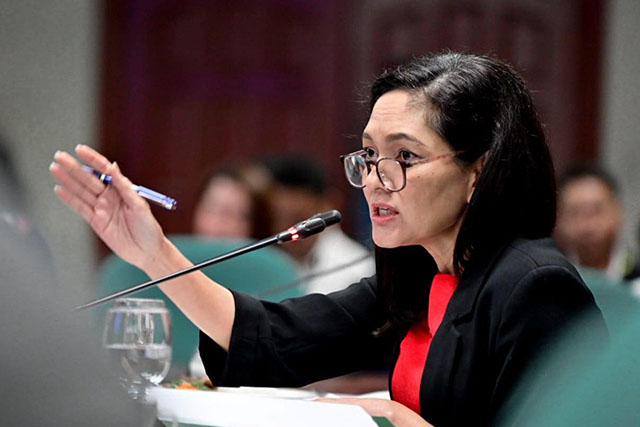
The hashtag #InternshipHorrorStories gained traction on Twitter Thursday night after Sen. Risa Hontiveros sought young Filipinos’ stories on their internship experiences days after she filed a bill against its exploitative practices.
Several Filipinos shared their own accounts under the hashtag, with stories touching on sexual harassment, job mismatching and unpaid long hours.
A Twitter user claimed that she was not able to get her stipend since she was constantly being harassed by some employees of a paint manufacturer.
Another user shared that she was “lied to” in her internship since she was supposed to work under product design as a fine arts student but was asked to “do tasks for marketing and sales” instead.
I was lied to in my internship. I was a product design intern, but I never got to experience design. I was made to stand in different stores and do tasks for marketing and sales in Makati and Alabang. The office was in QC. No allowance, no compensation. #InternshipHorrorStories pic.twitter.com/cZfipUWmOS
— hime ☀️ | #JoinAkbayanYouth (@jeninna) September 12, 2019
“Hours required for me to be in the physical stores ranged from 5 to 8 hours. Alone. I had to observe consumer behavior or even nudge them to buy the product,” she wrote in a thread.
“I’d have to commute to and from those places (Glorietta and Alabang Town Center) on my own. I was there as a student of Fine Arts. I was there to learn product design,” the user continued.
Another Twitter user alleged that medical students are not compensated for their internship and are expected to provide for their own needs such as lab gowns and masks.
Nurse interns serve in hospitals for 3 school years WITHOUT PAY nor do we receive any allowance for transpo/supplies like masks/gloves. Instead, we pay the hospital an affiliation fee for the “experience” that doesn’t even count in employment applications #InternshipHorrorStories
— 𝒌𝒓𝒊𝒔𝒕𝒆𝒓 (@kristerbaylosis) September 12, 2019
Another remarked that companies should not allow interns to render overtime or work beyond their supposed hours if they are not even compensated in the first place.
If you’re not gonna pay your interns, DONT even DARE to make them work beyond work hours!!! PAY YOUR INTERNS!!! NOW IS THE TIME #internshiphorrorstories
— reg (@reginarebueno) September 12, 2019
The hashtag #InternshipHorrorStories was initiated by Hontiveros who said that she heard of Filipino youth’s stories about maltreatment or being exploited during their internship as college students.
“I want to hear you out. For our campaign for an Interns’ Rts (Rights) & Welfare Law, what are your #InternshipHorrorStories?” she wrote on Twitter.
Heard of interns being sexually harassed. Others were asked to extend even after they completed their hours, kundi ipinagkait ang certificates nila.
I want to hear you out. For our campaign for an Interns’ Rts & Welfare Law, what are your #InternshipHorrorStories? pic.twitter.com/fAMScwyxJb
— risa hontiveros (@risahontiveros) September 12, 2019
Hontiveros on Tuesday filed a measure that seeks to protect interns from exploitative practices.
Senate Bill 994 or the “Interns’ Rights and Welfare Act of 2019” mandates internships to have reasonable working hours and provide just compensation to interns.
For students interning in government offices, they must only render a maximum of 300 hours and not go beyond six months. For those in the private sector, maximum hours are capped at 660 hours per semester.
The measure also protects them from discrimination arising from sexual orientation, gender identity and expression, age, ethnicity, religion, and disability, as well as internship practices considered derogatory and exploitative.
It also requires employers to provide a contract and program detailing the intern’s professional training so that they wouldn’t be idle or relegated to menial tasks like coffee brewing.

Hontiveros noted that students and young people are supposed “to learn more about the workplace” and “deepen their craft” during internships.
“Internship is not an excuse for employers to take advantage of cheap or free labor… Dahil walang employer-employee relationship, maraming nagiging kaso ng exploitation at kawalan ng professional growth,” she reasoned.
“For industries, interns in their workplaces could provide unique insights for improvement, new talent that can invigorate their operations and overall performance, and fresh perspective for solving issues in their organizations,” the lawmaker said.
The importance of internships
An internship is required for college students to get a feel of the working culture before they formally enter professional industries once they attain their degrees.
It is meant to provide them with “an opportunity to complement their formal learning with practical knowledge, skills and desirable attitudes,” according to the Commission on Higher Education.
The program is also viewed to “train student interns under actual workplace conditions,” as stated in CHED’s memorandum order listing guidelines for student internship programs.
A global intern program noted that students need internships to instill in them work ethics that cannot be attained or acquired in school alone.
Internships equip them with other soft skills that would be useful in the workforce such as time management and teamwork or the ability to work harmoniously with other people.
A Pensylvania-based educational institution also cited reasons why attaining internships are crucial in a student’s life.
“From the student perspective, an internship assists with career development by providing real work experiences that provide students with opportunities to explore their interests and develop professional skills and competencies,” the Penn State-College of Education said.
“From the agency/facility perspective, an internship provides a unique training experience designed to enhance the professional development and functioning of the student/supervisee,” it added.
“In accepting students as interns, the agency/facility representative recognizes that the internship is a learning process designed to promote professional growth of the supervisee,” the educational institution continued.









